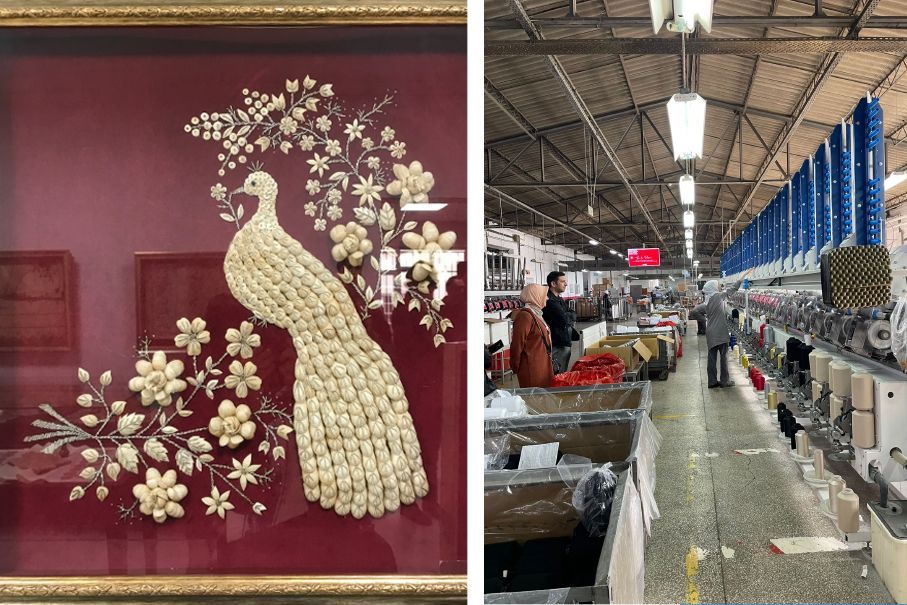
N ° 2 8 D E C E M B E R 2 0 2 3
Thank you to all the speakers and participants of TCBL Days 2023! Your enthusiasm, your astonishment and your questions show us how TCBL must continue to connect and inform all the people, organizations and platforms involved in the sustainable transformation of the textile – clothing sector. In case you missed any debates and sessions, you can find them on TCBL YouTube channel.
Happy reading and happy end-of-year holidays!
The editorial team
LOCAL
Herewear
The development of digital twins is a market estimated at $19 billion in 2023, with very strong growth (according to Mordor Intelligence). In factories, these digital models make it possible to visualize production flows and estimate the results of variations – particularly inputs – on final production. It is this flexibility that we are testing in the small series production of bio-sourced, local and circular clothing, and which we wish to develop on a smaller scale.

FIBERS
Herewear
Biosourced plastic textile fibers are alternatives to petrosourced plastic fibers. They are partly or completely made from resources derived from biomass – agricultural crops, sugar cane, potatoes or marine crops. In a more virtuous approach, it is preferable to use biosourced plastic textile fibers from residues – without competition with food production – and from local crops minimizing their environmental footprint – water, fertilizers, pesticides. Several value chain models making it possible to relocalize the production of biosourced fibers by integrating agricultural and textile production upstream were one of the questions in the TCBL debate on November 23.

COLLABORATIONS
Herewear
Ecosystex is a community of practices which brings together European projects aimed at supporting the 2030 strategy for the transformation of the textile – clothing sector. Six projects were presented during this first conference, including HEREWEAR, which presented both the concept of the project – biosourced, local and circular – and the first prototypes produced in small series, from these new fibers with connected models.

DISCOVERY
TexRev
First milestone in the TexRev project. In Bursa, exciting discovery of textile production and new technical training courses, both inspired by the construction and assembly of traditional clothing – caftans, embroidery, hats, vegetable dyes etc. – but also by pioneering projects in industrialization circular practices allowing a reduction in the consumption of water, energy, chemicals or the use of new natural and biosourced fibers.

INCLUSIVITY
Cross-functional projects
Developing a fashion brand requires creativity and business know-how, while being accessible to all talents, regardless of origins and socio-cultural backgrounds. But if training in this creativity becomes a domain reserved for the wealthy classes, does it not risk losing its meaning – valuing difference? This is a question asked in many countries (here in the UK) and explored in the TCBL debate on November 15. Our solutions consist of training courses open to all talents, in textile laboratories connected to an ecosystem of laboratories, allowing them to develop their skills in collective and inclusive innovation through practice and in groups in the service of textile production. sustainable clothing.
INNOVATIONS
Bonus repair. A stain or rip have become sufficient reasons to throw away an item of clothing. Can we do otherwise? Relearn stain removal and mending to transform them into services or levers of creativity – with embroidery, visible mending, etc. – and use the clothing repair bonus.
Normal Phenomena of Life (NPOL) launches jackets and T-shirts whose almost unique patterns are the result of bacterial dyes or algae-based inks. The characteristics of these clothes are very detailed on technical sheets – requirement for transparency oblige, which results in very high prices. NPOL is the result of a Joint Venture between Faber Futures and Gingko Bioworks.
The Stormshadow Parka from Patagonia is one of the warmest jackets in the Patagonia catalog. It combines down, recycled PFC-free Gore-Tex and an outer layer partly made from plastic waste collected and transformed in Costa Rica by Bionic.
The R3iLab Korea – Japan Learning Tour in November 2023, allowed all participants to familiarize themselves with emerging and already industrialized innovations on digitalization, the industry of the future – known as 5.0 – and new experiences or services associated with retail.
INSPIRATIONS
The 2023 Made in France Fair brought together almost 1,200 exhibitors, with textiles as the leading sector in front of the house and the gastronomy. This success echoes the global and growing interest in this purchasing criterion – determining or important for 62% of French people and +2 points vs 2021. In the textile sector, heavyweights were present – eg in jeans, fabrics, natural materials – as well as ultra-responsible initiatives that are now credible and a welcome space dedicated to manufacturing work. MIF EXPO conferences The MIF EXPO pop-up factory
The risk of methane in recycling
One of the first reflexes in the sustainable transition is to think about recycling. However, when we look closely at landfills – like those in Washington and Oregon in the US – we see that they could explode due to methane – a gas 84 times more powerful than CO2, from food waste, garbage greens and cardboard – the rate of which is also regularly undervalued. One more reason to separate the collection of textiles from other products, knowing that recycling must be the last loop of reuse of textiles and the smallest possible futures market. Read more
Who benefits from the crime?
The efforts of large fashion companies to improve their environmental performance must be highlighted, and as was highlighted in the TCBL debate of November 30, they are led to ally themselves with small, agile, committed and activist companies, to move forward in their fight for more sustainable production. On the other hand, postpone the slowness of their transformation
on the back of
consumers – like
this article from the Financial Times
suggests it – is a
storytelling
in total contradiction with a culture of cost-driven business models, which require us to produce more and more – and therefore sell more and more – and create an addiction to shopping.
Watch the video
RENDEZ-VOUS

The December cultural program at ENSAD
Like every month, very high quality exhibitions and meetings.

The Fashion Green Days from Nantes took place in mid-November, echoing the new dynamics of the territories.

Wool Week in the Shetland Islands: an event born in 2010 to celebrate sheep and wool workers for a week in the fall. This year again, nearly 800 participants welcomed, from all over Europe!

The In Climate Mode Association, an advocacy coalition bringing together actors concerned by the fashion climate emergency.
TCBL Association is an ecosystem of labs, businesses and platforms connected to develop radical transformation of the textile and clothing industry: “People Like You”! Are you ready to make a difference? Find out about membership here
Do you have questions or comments about the topics in this newsletter, or ideas about the textile industry? Do not hesitate to contact us :
contact@audasud.fr
Publication director: Frédérique Thureau
This newsletter is published by: Audasud
8 Avenue Victor Hugo, 34200 Sète - France
Copyright © 2023 Audasud
Add us to your address book




